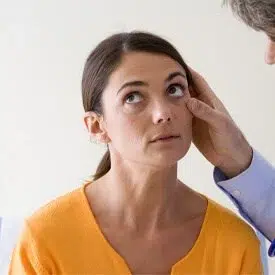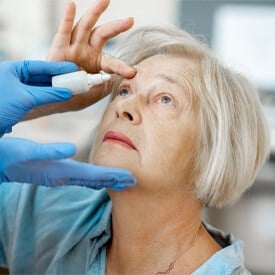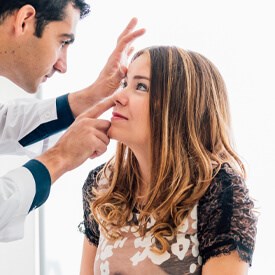Blepharitis (Lid Disease) in Lake Worth, FL
What Is Blepharitis?
Your upper and lower eyelids have glands on the edges that are critical for tear production. Sometimes, the glands in these areas can get clogged or infected, increasing the risk of experiencing blepharitis or lid disease. This uncomfortable eye condition causes irritation around the margins of your eyelid or on the lash line. Although blepharitis does not cause vision loss, you may encounter several symptoms, such as crustiness, redness, and eyelash reduction. We invite you to schedule an appointment at Palm Beach Eye Center in Lake Worth, FL, if you think you may have lid disease. Our team is dedicated to helping manage your ocular health and providing helpful treatment options.
What Are the Symptoms of Blepharitis?
The symptoms of lid disease can vary from person to person. However, some of the most common eyelid inflammation symptoms patients experience include:
- Itchy, sore eyelids
- Eyelids sticking together
- Swollen eyelid margins
- Increased sensitivity to light
- Abnormal eyelash growth
- Red and watery eyes
These symptoms are often associated with chronic eyelid conditions, blepharitis, and meibomian gland dysfunction. If you are experiencing any of the above-listed symptoms, it may be time to be evaluated by an optometrist. Connect with a member of our team to be seen by one of our experienced providers and receive guidance on eyelid disease treatment and long-term eye comfort.
What causes lid disease?
Blepharitis can be caused by several factors that affect eyelid health and tear stability. Chronic eyelid inflammation can develop due to one or more of the following common causes of blepharitis:
- Bacterial eyelid infection
- Clogged eyelid oil glands or meibomian gland dysfunction
- Dry eye disease
- Eyelash mites or lice
- Rosacea-related eye inflammation
- Allergic reactions to makeup or contact lens solutions
- Seborrheic dermatitis, a dandruff-like condition that can affect the scalp, eyebrows, and eyelids
If you need help managing blepharitis symptoms, eyelid irritation, or any of the conditions listed above, contact our office to schedule an evaluation with one of our experienced ophthalmologists.
What Are the Risk Factors of Blepharitis?
Blepharitis has several risk factors that can increase its likelihood. These include:
- Having oily skin or dandruff, which can contribute to blocked oil glands, eyelid inflammation, and chronic blepharitis symptoms
- Chronic conditions such as rosacea or seborrheic dermatitis, which can affect the skin, eyelid margin health, and long-term eye irritation
- A history of allergies or frequently wearing contacts, as these factors can irritate the eyelids, disrupt the tear film, and contribute to eye infections
- Poor eyelid hygiene, which allows bacteria and debris to build up along the lash line and worsen blepharitis flare-ups
- Prolonged exposure to environmental irritants such as smoke, dust, or pollution, which can aggravate dry eye symptoms and eyelid sensitivity
How is Blepharitis Diagnosed?
Blepharitis is diagnosed through a comprehensive eye examination performed by an eye care professional. During the exam, your doctor reviews your medical history and discusses current concerns before closely evaluating your eyelids and eyes for signs of eyelid inflammation causes. A specialized magnifying instrument is often used to examine the eyelid margins, the base of the eyelashes, and the oil-producing glands to assess overall eyelid health. This detailed inspection helps identify redness, crusting, irritation, and structural changes associated with inflammatory eye conditions. In some cases, additional testing may be recommended to rule out other sources of eye irritation, including allergic reactions, dry eye conditions, or dermatologic disorders affecting the eyelids. The doctor may also collect a small sample of eyelid secretions or gently scrape the lid surface to check for bacterial overgrowth, fungal involvement, or immune responses linked to ocular surface disorders. Through this thorough evaluation, the eye care provider can confirm a blepharitis diagnosis and recommend a targeted, effective treatment approach.
What Are the Benefits of Treating Blepharitis?
The benefits of effectively treating blepharitis reach beyond short-term symptom control, supporting long-term eye comfort and daily visual function. By reducing eyelid inflammation and irritation, patients often notice improvements that positively affect overall eye wellness, including:
- Improved Comfort: Reduction in eyelid irritation, itching, and discomfort
- Enhanced Vision: Clearer vision by minimizing tear film instability and corneal involvement
- Decreased Risk of Complications: Lowered chances of secondary infections or corneal damage
- Better Eyelid Hygiene: Establishing a routine of eyelid hygiene prevents recurrence and promotes overall eye health
Who is a candidate for blepharitis treatment?
If you are experiencing symptoms of blepharitis that interfere with daily comfort, it may be time to seek professional care at Palm Beach Eye Center for targeted eyelid inflammation treatment. The most effective approach for managing blepharitis can vary based on symptom patterns, flare frequency, and whether chronic eyelid conditions are present. Our eye care team in Lake Worth, FL, evaluates each case carefully to recommend personalized options that support long-term eye irritation relief and improved eyelid health.
How Is Blepharitis Treated?
Blepharitis often develops due to bacteria along the edges of the lash line or dysfunction in the oil glands that support healthy tear film balance. Maintaining proper eyelid hygiene and managing the natural bacteria around the eyes can help lower the risk of flare-ups and ongoing eyelid irritation. If an oil gland concern is present, we address it directly during your visit as part of a targeted blepharitis treatment plan. While blepharitis does not have a permanent cure, symptoms can be effectively managed and reduced with a few consistent adjustments to your daily routine, including:
- Starting your day with a cleansing regimen: Our eye specialists recommend gently washing your face and eyelids using a cleanser formulated for sensitive eyes to help reduce debris and bacteria along the lash margins.
- Using warm compresses: With a clean washcloth dampened in warm water, apply the compress to the eyes to help loosen buildup, support meibomian gland function, and minimize crusting around the eyelids.
- Taking antibiotic eye prescriptions: In some cases, prescription ointments or eye drops may be used along the lash line to stimulate oil flow, calm eye discomfort, and reduce ongoing symptoms.
During your consultation, our eye doctors carefully evaluate your eyes and eyelids to determine the severity of your blepharitis and recommend appropriate care. Based on your needs, your plan may include additional at-home techniques or advanced in-office treatments for blepharitis to support long-term symptom control
Blepharitis (Lid Disease) FAQ
If I have blepharitis, is it contagious?
No, it is not contagious. Feel free to continue your normal routine without worry.
Can blepharitis make dry eye worse?
Blepharitis happens when you have an overload of bacteria on the eyelids. This can also cause the glands in the eyelids to become blocked. When they are blocked, it can decrease oil production and cause dry eye.
Can I wear eye makeup with blepharitis?
Makeup can worsen bleharitis, so we recommend not wearing any eye makeup until your condition improves. Using makeup products with little to no synthetic parabens and waxes may also be beneficial. If you are seeking blepharitis treatment in Lake Worth, FL, contact our office to schedule an appointment.
What can cause blepharitis to flare up?
Blepharitis can become aggravated in windy winter weather or a heavily air-conditioned environment. This condition can also be triggered by lifestyle factors such as prolonged computer use, contact lens wear, sleep deprivation, and dehydration.
Can blepharitis lead to complications?
Yes, untreated blepharitis can lead to complications like dry eye syndrome, styes, chalazia, and corneal irritation.
Is blepharitis the same as dry eye syndrome?
No, but they are often related. Blepharitis can contribute to dry eye symptoms by affecting the quality of tears.
Specialty Care for Eyelid Inflammation
Although this disease is relatively harmless, blepharitis can create irritating symptoms that hinder your ability to live comfortably. At Palm Beach Eye Center, our Lake Worth, FL, eye doctors provide detailed treatment plans to address lid disease and enhance your overall eye health. Please schedule an appointment with our friendly staff to learn about your options for managing eyelid disease.
*Individual results are not guaranteed and may vary from person to person. Images may contain models.





